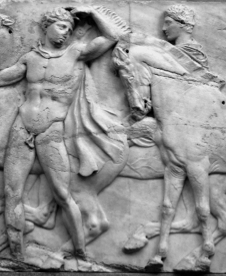[continued from page 2]
Twenty-first century readers who lack special schooling or
assistance often find that they understand progressively less about
what they are reading as they proceed into a book written by an
ancient historian. The further on they go, the greater becomes the
number of strange elements they encounter that in modern terms
seem foreign, strange, and inexplicable. How much of a historical
narrative can modern readers expect to comprehend if they are
ignorant of the date or location of many events, if they cannot envision
the temporal or geographic relationship between events, or are
unaware of the meaning and significance of important aspects of those
events? The resulting ignorance creates a barrier which obscures their
perception, diminishes their interest, and separates them from an
essential quality of the narrative: its historicity. At its worst, the
ancient text becomes a literary exercise, a dreary recitation of
disconnected incidents occurring at unknown places, concerning
artificial characters whose names cannot be pronounced. At best, it
reads like a modern fantasy novel, but all too often, it is a bad novel, a
boring novel. Worst of all, the historicity of the narrative, the drama
which arises from the knowledge that it describes real people
grappling with real dilemmas in the world that was all too real to
them, is lost.
assistance often find that they understand progressively less about
what they are reading as they proceed into a book written by an
ancient historian. The further on they go, the greater becomes the
number of strange elements they encounter that in modern terms
seem foreign, strange, and inexplicable. How much of a historical
narrative can modern readers expect to comprehend if they are
ignorant of the date or location of many events, if they cannot envision
the temporal or geographic relationship between events, or are
unaware of the meaning and significance of important aspects of those
events? The resulting ignorance creates a barrier which obscures their
perception, diminishes their interest, and separates them from an
essential quality of the narrative: its historicity. At its worst, the
ancient text becomes a literary exercise, a dreary recitation of
disconnected incidents occurring at unknown places, concerning
artificial characters whose names cannot be pronounced. At best, it
reads like a modern fantasy novel, but all too often, it is a bad novel, a
boring novel. Worst of all, the historicity of the narrative, the drama
which arises from the knowledge that it describes real people
grappling with real dilemmas in the world that was all too real to
them, is lost.
The Landmark editions attempt to reduce these barriers between
the general reader and ancient historical texts. They contain many
features designed to keep readers oriented and at all times aware of
the action’s date and location, and to provide information and
explanation about those ancient devices or practices which today
might prove unfamiliar and puzzling, if not incomprehensible.
the general reader and ancient historical texts. They contain many
features designed to keep readers oriented and at all times aware of
the action’s date and location, and to provide information and
explanation about those ancient devices or practices which today
might prove unfamiliar and puzzling, if not incomprehensible.
Copyright © 2010 by Robert B. Strassler
A Letter from the Editor

Cavalcade from the north frieze of the Parthenon,
c. 447–433 B.C.E.
c. 447–433 B.C.E.
Map of ancient Athens and the long walls to its port Peiraieus.
In Print
Forthcoming

